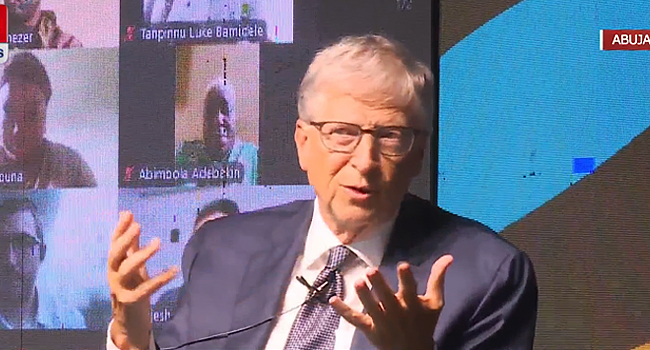Microsoft Co-founder Bill Gates emphasized that enhancing agricultural productivity is crucial to addressing global malnutrition, particularly in Sub-Saharan Africa.
Speaking at Nutrivision 2024, a Pan-African Youth Dialogue on Nutrition held at Nile University Abuja, Gates, who is also Co-Chair of the Bill & Melinda Gates Foundation, highlighted the importance of making food more accessible and affordable through improved agricultural practices and better seeds.
Gates pointed out that malnutrition is a significant barrier to realizing human potential, explaining that malnourished individuals are at a much higher risk of severe outcomes from diseases like malaria and diarrhea. “If you are malnourished, your risk of dying from these illnesses doubles. Even if you survive, malnutrition affects your ability to excel in education and other activities,” he said.
He noted that stunting, indicated by height for age, is a common sign of malnutrition, and one solution lies in boosting agricultural productivity. “Part of combating malnutrition involves increasing access to affordable foods, particularly milk. By making food more available at a low cost and using better seeds, especially those that can withstand the challenges of climate change, we can improve outcomes,” Gates explained.
Gates also expressed concern about the high levels of undernutrition in Sub-Saharan Africa, where rates have yet to decline. He acknowledged that high inflation in countries like Nigeria exacerbates the challenge of accessing quality food, further complicating efforts to reduce malnutrition.
Interestingly, Gates pointed out that malnutrition can persist even when children have access to enough food, often because their diets lack the necessary nutrients for proper absorption.
He emphasized that addressing malnutrition requires early intervention, starting even before and during pregnancy. “One of the best ways to combat malnutrition is to support mothers before and during pregnancy. We are focusing many of our interventions on helping mothers during this critical period,” Gates said. He noted that new micronutrient supplements (MMS) have been added to prenatal care, with three million bottles soon to be available in Nigeria to help reduce maternal anemia and save the lives of 70,000 babies.
Gates expressed optimism about the Gates Foundation’s increased investment in nutrition but acknowledged that the issue is complex, requiring collaboration between the health and agricultural sectors.



